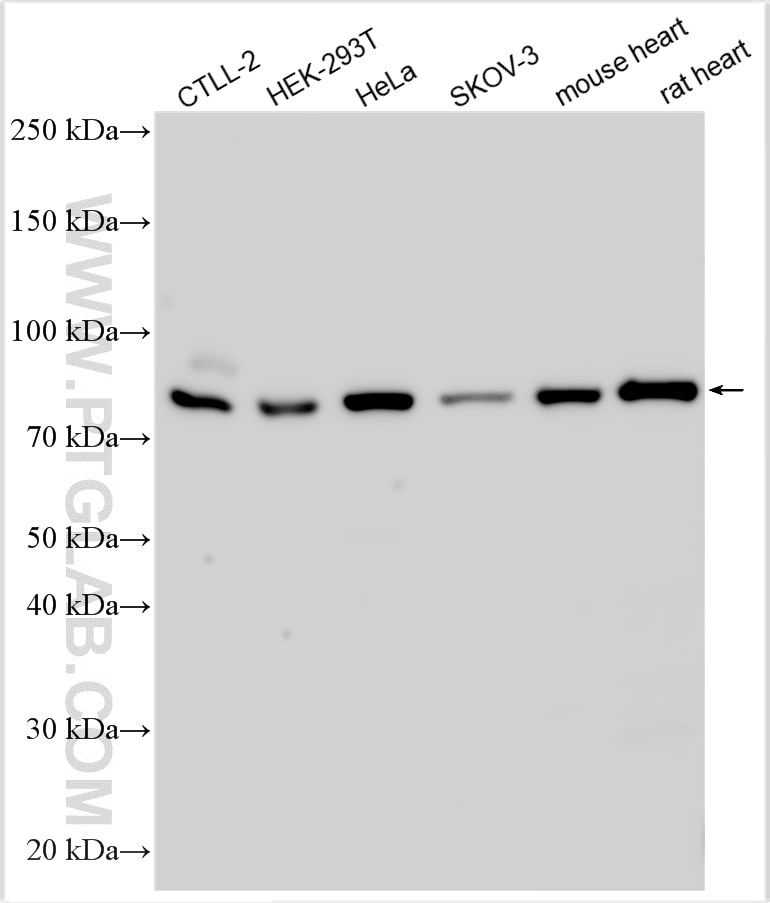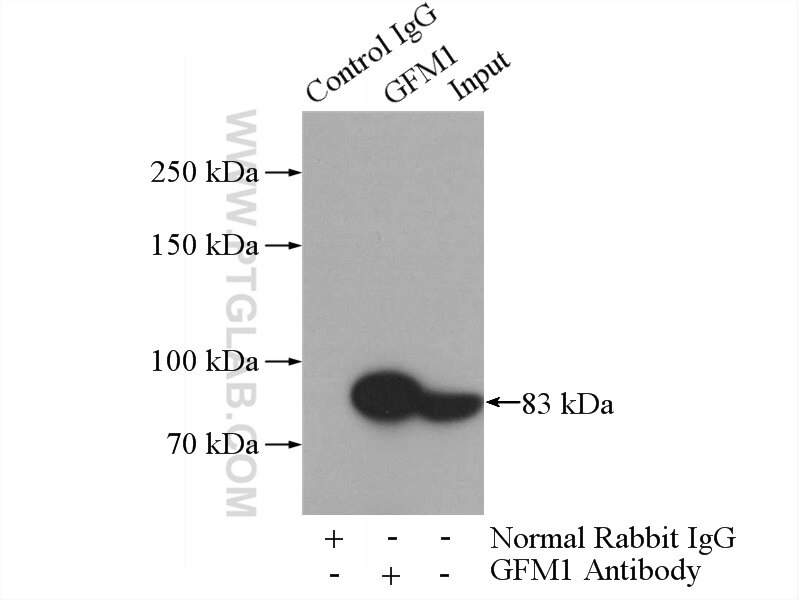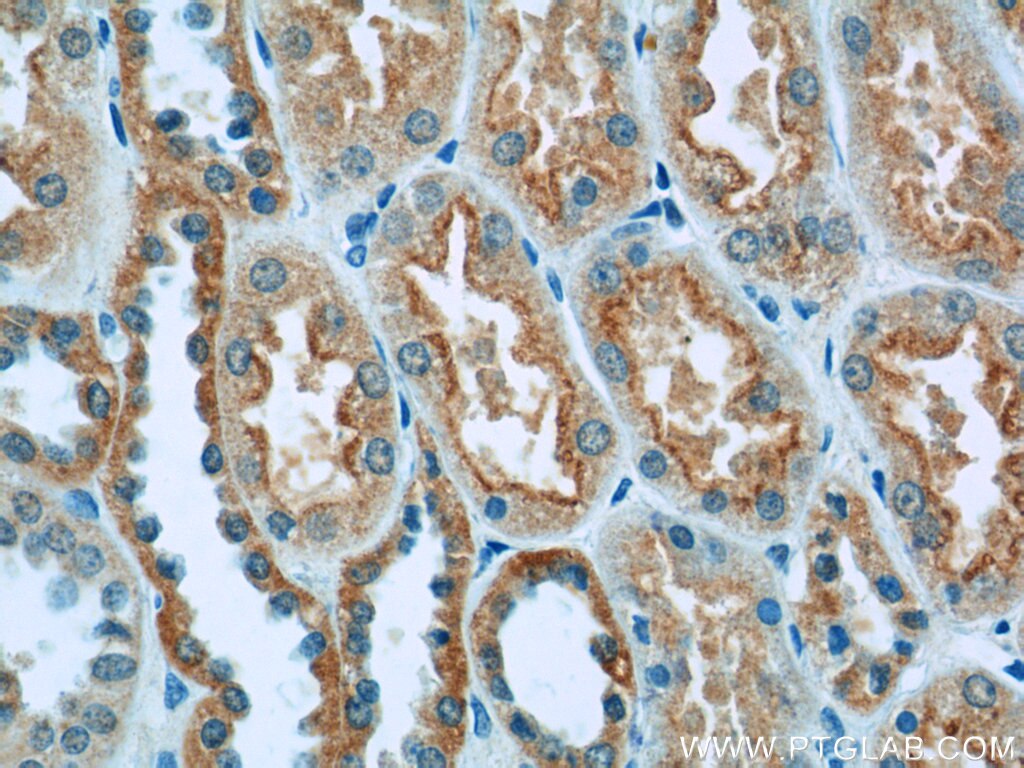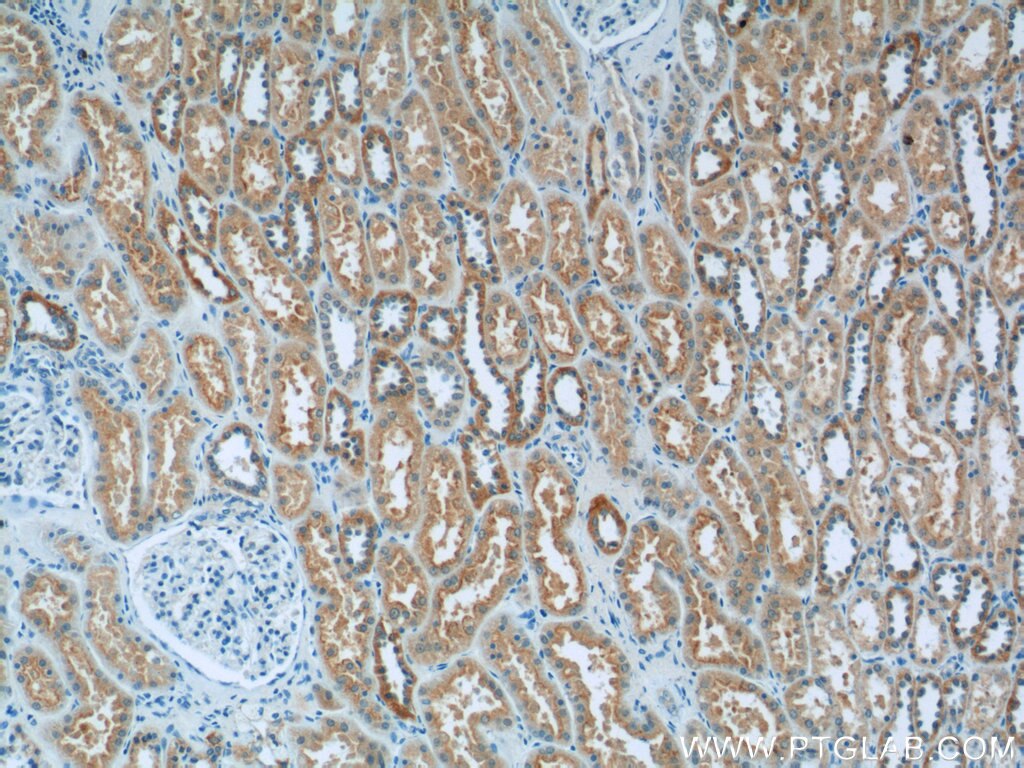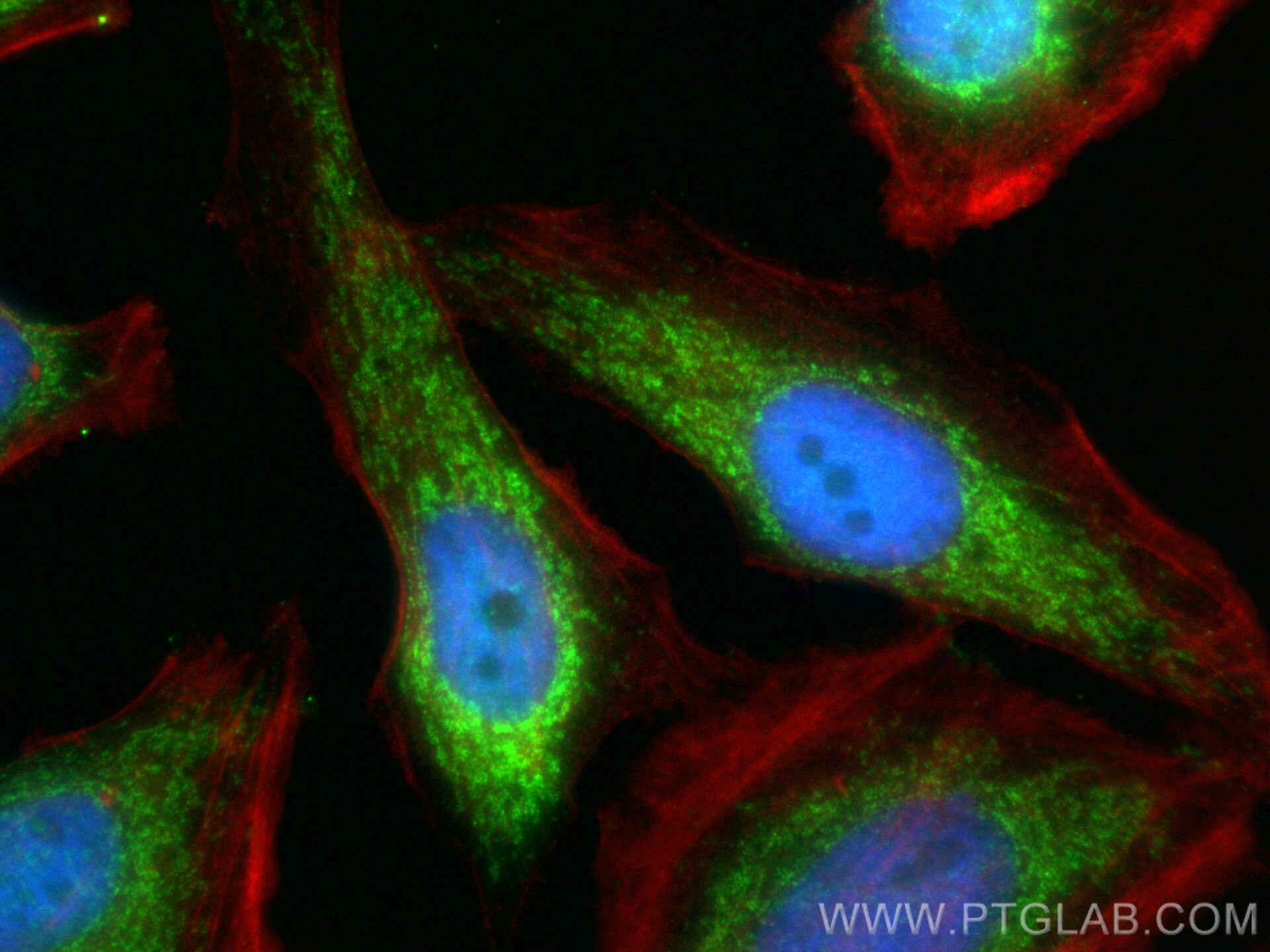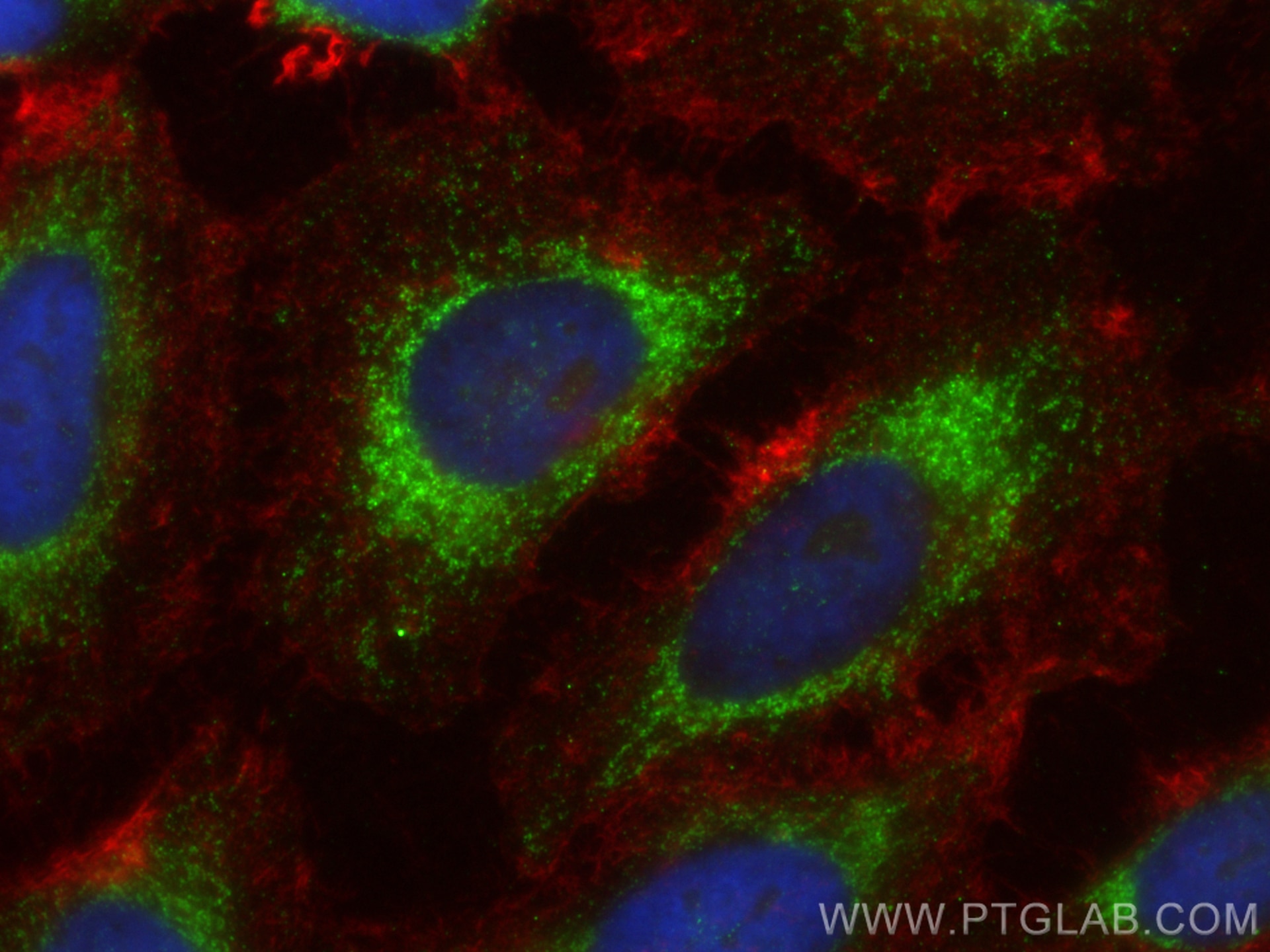Anticorps Polyclonal de lapin anti-GFM1
GFM1 Polyclonal Antibody for WB, IHC, IF/ICC, IP, ELISA
Hôte / Isotype
Lapin / IgG
Réactivité testée
Humain, rat, souris
Applications
WB, IHC, IF/ICC, IP, CoIP, ELISA
Conjugaison
Non conjugué
N° de cat : 14274-1-AP
Synonymes
Galerie de données de validation
Applications testées
| Résultats positifs en WB | CTLL-2 cells, cellules HEK-293T, cellules HeLa, cellules SKOV-3, tissu cardiaque de rat, tissu cardiaque de souris |
| Résultats positifs en IP | cellules HeLa |
| Résultats positifs en IHC | tissu rénal humain il est suggéré de démasquer l'antigène avec un tampon de TE buffer pH 9.0; (*) À défaut, 'le démasquage de l'antigène peut être 'effectué avec un tampon citrate pH 6,0. |
| Résultats positifs en IF/ICC | cellules HeLa, |
Dilution recommandée
| Application | Dilution |
|---|---|
| Western Blot (WB) | WB : 1:1000-1:4000 |
| Immunoprécipitation (IP) | IP : 0.5-4.0 ug for 1.0-3.0 mg of total protein lysate |
| Immunohistochimie (IHC) | IHC : 1:20-1:200 |
| Immunofluorescence (IF)/ICC | IF/ICC : 1:50-1:500 |
| It is recommended that this reagent should be titrated in each testing system to obtain optimal results. | |
| Sample-dependent, check data in validation data gallery | |
Applications publiées
| WB | See 4 publications below |
| CoIP | See 1 publications below |
Informations sur le produit
14274-1-AP cible GFM1 dans les applications de WB, IHC, IF/ICC, IP, CoIP, ELISA et montre une réactivité avec des échantillons Humain, rat, souris
| Réactivité | Humain, rat, souris |
| Réactivité citée | Humain, souris |
| Hôte / Isotype | Lapin / IgG |
| Clonalité | Polyclonal |
| Type | Anticorps |
| Immunogène | GFM1 Protéine recombinante Ag5616 |
| Nom complet | G elongation factor, mitochondrial 1 |
| Masse moléculaire calculée | 86 kDa |
| Poids moléculaire observé | 85 kDa |
| Numéro d’acquisition GenBank | BC049210 |
| Symbole du gène | GFM1 |
| Identification du gène (NCBI) | 85476 |
| Conjugaison | Non conjugué |
| Forme | Liquide |
| Méthode de purification | Purification par affinité contre l'antigène |
| Tampon de stockage | PBS with 0.02% sodium azide and 50% glycerol |
| Conditions de stockage | Stocker à -20°C. Stable pendant un an après l'expédition. L'aliquotage n'est pas nécessaire pour le stockage à -20oC Les 20ul contiennent 0,1% de BSA. |
Informations générales
Different factors catalyze the three stages of protein translation: initiation, elongation, and termination. There are two translational systems in eukaryotes, one in the cytoplasm and the other in the mitochondria. In mitochondria, the elongation phase requires three elongation factors (EF): Tu (TUFM), Ts (TSFM), and G (GFM1)[PMID:19716793]. GFM1 catalyzes translocation during peptide elongation and mediates ribosomal disassembly during ribosome recycling in concert with the ribosomal recycling factor (RRF). [PMID:16487710]
Protocole
| Product Specific Protocols | |
|---|---|
| WB protocol for GFM1 antibody 14274-1-AP | Download protocol |
| IHC protocol for GFM1 antibody 14274-1-AP | Download protocol |
| IF protocol for GFM1 antibody 14274-1-AP | Download protocol |
| IP protocol for GFM1 antibody 14274-1-AP | Download protocol |
| Standard Protocols | |
|---|---|
| Click here to view our Standard Protocols |
Publications
| Species | Application | Title |
|---|---|---|
Sci Transl Med Molecular diagnosis of infantile mitochondrial disease with targeted next-generation sequencing. | ||
Int J Mol Sci Translation Fidelity and Respiration Deficits in CLPP-Deficient Tissues: Mechanistic Insights from Mitochondrial Complexome Profiling | ||
Cells Inactivity of Peptidase ClpP Causes Primary Accumulation of Mitochondrial Disaggregase ClpX with Its Interacting Nucleoid Proteins, and of mtDNA. | ||
Avis
The reviews below have been submitted by verified Proteintech customers who received an incentive for providing their feedback.
FH Miguel (Verified Customer) (03-21-2022) | WB analysis of mouse liver using 14274-1-AP. Mouse liver homogenates in Ripa buffer were subjected to SDS PAGE followed by western blot with 14274-1-AP (GFM1 antibody) at dilution of 1:1000 incubated at 4°C O/N. KI/KO: Compound heterozygous knock-in/knock-out (Gfm1R671C/-) mouse model (1). WT: Wild type control mice (Gfm1+/+). (1) ) Molina-Berenguer M, Vila-Julià F, Pérez-Ramos S, Salcedo-Allende MT, Cámara Y, Torres-Torronteras J, Martí R. Dysfunctional mitochondrial translation and combined oxidative phosphorylation deficiency in a mouse model of hepatoencephalopathy due to Gfm1 mutations. FASEB J. 2022 Jan;36(1):e22091. doi: 10.1096/fj.202100819RRR. PMID: 34919756.
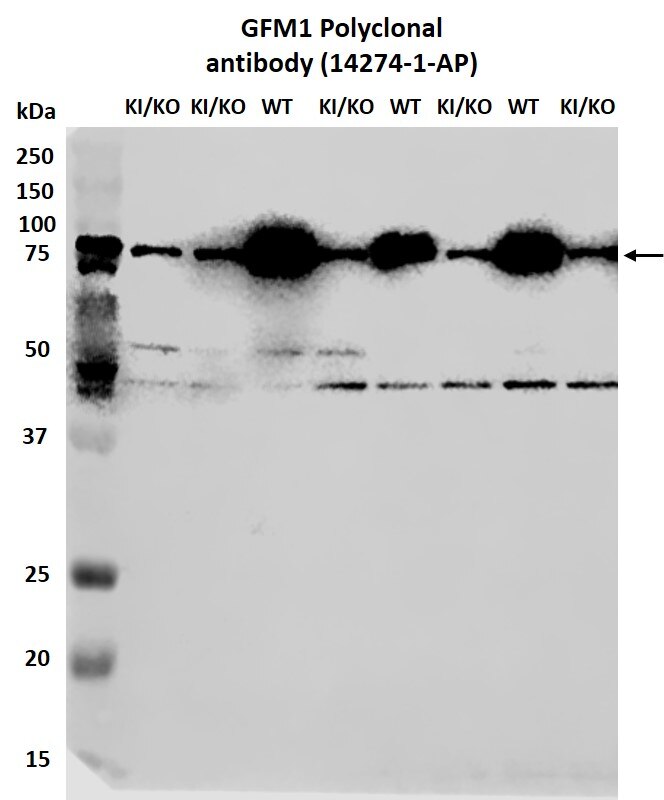 |
